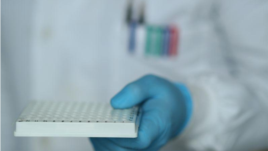26 May 2020
Scientists say that measuring coronavirus levels in wastewater could help them estimate the number of infections in communities.
The method could be used around the world to identify where the virus is spreading and reduce the need for mass testing.
Small studies carried out in Europe and Australia suggest that signs of the coronavirus can be found in sewage – waste material carried away from homes and other buildings in a system of pipes. Those findings have led some scientists to consider wide wastewater testing to estimate the number of infected people in a given area.

A scientist works in the lab at the Roslin Institute in Edinburgh, Scotland, amid the outbreak of the coronavirus disease (COVID-19), on May 13, 2020. (REUTERS/Russell Cheyne)
Davey Jones is a professor of environmental science at Britain's Bangor University. He told the Reuters news agency that the virus enters the sewage system in particles released in the solid waste of infected individuals. "We're using that (knowledge) and tracking people's toilet movements," Jones said.
The sewage method has been used before to measure health threats and follow the spread of disease. For example, it has been used in the worldwide fight against polio. And, scientists in Britain and other places have used it to measure antibiotic resistance of farm animals.
Alex Corbishley is a scientist with the Roslin Institute in Edinburgh, Scotland. He is running a three-month test project to track the coronavirus in wastewater in Scotland.
He said the method has been used before to estimate infection rates of other diseases. But, he noted, "it's never really been applied to an outbreak in this way."
Corbishley said the idea is to create a system that can estimate mass virus infection rates for a lot less money than the cost of traditional testing.
The scientists involved in the first studies in Europe and Australia explained that what they are collecting is not live, infectious virus. They instead collect dead particles or parts of the virus's genetic material that are not infectious.
In a test project in Queensland, Australia, scientists were able to identify part of a coronavirus gene in sewage from two wastewater treatment plants.
In the Netherlands, researchers acted ahead of the coronavirus outbreak there and took samples from seven cities and a major airport in February and March. They found no levels of the virus three weeks before the country's first case was identified. But by March 5 –- just a week after the first case was confirmed there -- they did find signs of the virus.
The researchers wrote in a paper published online that "sewage surveillance" can be a valuable tool to follow the spread of viruses, even in areas with less severe outbreaks.
French scientists reported findings in April showing that wastewater sampling in Paris over a one-month period followed the same period of rising and falling of coronavirus cases there.
Few countries have the resources to carry out virus tests on each individual person. Most nations are only in a position to test healthcare workers or people who have severe symptoms and require hospitalization. So, local officials have limited information about how widespread the coronavirus is and whether it is affecting some communities more than others.
"You can use this type of surveillance as a public health tool," said Andrew Singer, a researcher at the UK Centre for Ecology and Hydrology. He is working with Davey Jones and others to create sewage testing plants in Britain.
Singer told Reuters that such efforts require little investment. But, he said, they could be a huge help in tracking the spread of the current virus as well as future outbreaks.
I'm Bryan Lynn.
Reuters reported on this story. Bryan Lynn adapted the report for VOA Learning English. Ashley Thompson was the editor.
We want to hear from you. Write to us in the Comments section, and visit 51VOA.COM.
________________________________________________________________
Words in This Story
toilet – n. a device used to expel body fluids and solids
track – v. to record the progress or development of something over time
outbreak – n. the sudden start of something unwelcome, like war or disease
sample – n. a small amount of something that represents what it is like
surveillance – n. the activity of watching people carefully, often secretly, especially by an army or police force
symptom – n. a change in the body or mind which indicates that a disease is present